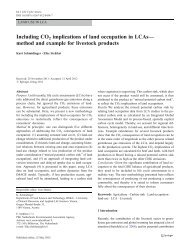production of animal proteins by cell systems - New Harvest
production of animal proteins by cell systems - New Harvest
production of animal proteins by cell systems - New Harvest
You also want an ePaper? Increase the reach of your titles
YUMPU automatically turns print PDFs into web optimized ePapers that Google loves.
Current developments in cultured meat research<br />
The Dutch 'In vitro meat' project funded <strong>by</strong> SenterNovem. After having obtained a<br />
patent an international patent on the 'industrial <strong>production</strong> <strong>of</strong> meat from in vitro <strong>cell</strong><br />
cultures' in 1999 (international application number PCT/NL98/00721), Willem van Eelen<br />
sought collaboration with academia and industry to obtain funding in order to realize his<br />
dream. In 2004, Utrecht University (Faculty <strong>of</strong> Veterinary Medicine, pr<strong>of</strong>. dr. Henk<br />
Haagsman and dr. Bernard Roelen), Eindhoven University <strong>of</strong> Technology (Department <strong>of</strong><br />
Biomedical Engineering, dr. Carlijn Bouten), University <strong>of</strong> Amsterdam (Swammerdam<br />
Institute for Life Sciences, pr<strong>of</strong>. dr. Klaas Hellingwerf), Meester Stegeman BV (at that<br />
time part <strong>of</strong> Sara Lee foods, Peter Verstrate) and Vitro Meat BV (Willem van Eelen)<br />
submitted a grant proposal to SenterNovem that was honored, resulting in the start <strong>of</strong><br />
the Dutch In Vitro Meat project in May 2005 that lasted until April 2009.<br />
The project was subdivided into 3 different areas: a) stem <strong>cell</strong> biology, conducted at<br />
Utrecht University; b) tissue engineering, conducted at Eindhoven Technical University;<br />
and c) culture media, conducted at the University <strong>of</strong> Amsterdam.<br />
To conduct this research, at Utrecht University 2 PhD students were appointed for a<br />
period <strong>of</strong> 4 years, and 1 post-doctoral fellow for a period <strong>of</strong> 2 years. Also at Eindhoven<br />
Technical University 2 PhD students were appointed for 4 years, and 1 post-doctoral<br />
fellow for a 2 year period. At the University <strong>of</strong> Amsterdam, 1 technician was appointed on<br />
this project for a period <strong>of</strong> 4 years.<br />
Experts’ opinions (4): Presumed qualities <strong>of</strong> cultured meat<br />
• There is no “objective” reason why in vitro meat should not have the same properties as<br />
conventional meat. Safety and sustainability are two major issues that favor cultured meat.<br />
• Production may be less safe because <strong>of</strong> risks <strong>of</strong> contamination.<br />
• Cultured meat will be safer and more sustainable than conventional meat.<br />
• Cultured meat may have a completely different risk pr<strong>of</strong>ile than conventional meat. Much<br />
attention should be paid to the safety <strong>of</strong> added substrates and other compounds <strong>of</strong> the culture<br />
medium. So, less risks with respect to microbial contamination but more risk <strong>of</strong> contamination<br />
<strong>of</strong> substrates.<br />
29



